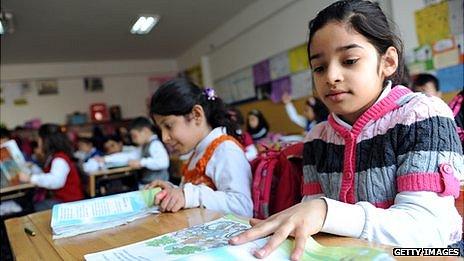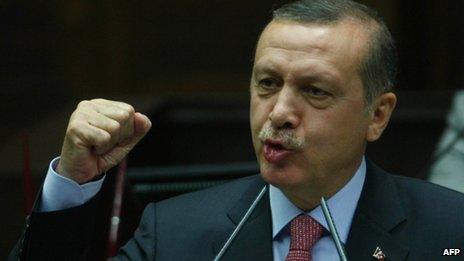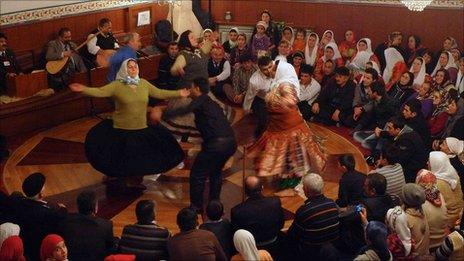Turkish press warms to Kurdish lessons in schools
- Published

Education reforms have sparked fierce debate about the defence of Turkey's secular traditions
The Turkish government's decision to allow the teaching of Kurdish in schools dominates the headlines in the country's newspapers.
Broadly pro-government and liberal newspapers welcome the move, but call on Kurds to reject the Kurdistan Workers' Party (PKK) armed group and not to allow the use of Kurdish to undermine national unity.
A writer in Cumhuriyet - a paper hostile to both the Islamist-rooted government and concessions to the Kurds - sees a US hand in the initiative. He sees it as part of a regional plan to disarm the separatist PKK.
Abdulkadir Selvi in moderate Islamist Yeni Safak
When we ask what the Kurds want, the answer is of course that the Kurds want to "live like people". What can be more natural than that? But there is a political will [the government], that has carried out all these reforms over the last ten years. The Kurds should see both this and the reality of the PKK, which answers the initiative with bullets. Yesterday Kurdish became an optional course in school, and three soldiers were killed.
Resul Tosun in Yeni Safak
There must be a right to education in the mother tongue, and this right must not be an obstacle to learning and teaching the official language. This right must not be interpreted and used to damage national unity and territorial integrity.
Mustafa Akyol in pro-government Star
We should also discuss considering Kurdish as a "second official language". However, while supporting all these ideas, I should also declare that I am against the establishment of an ethnic-based federation or "autonomous region" in Turkey. Because such a geographical division would both escalate ethnic tension and make the southeast a victim of the PKK's totalitarian targeting.
Cengiz Candar in centre-left Radikal
Are the Kurds not citizens of this country? Kurdish is their mother tongue. It is every individual's human right to have education in his or her mother tongue. If you treat some of your citizens' mother tongue as a foreign language, you will show how far you are from the principle of equality regarding the solution of the problem.
Fikret Bila in centre-right Milliyet
On the one hand objections will continue along the lines that "an optional course is an insult; Kurdish must be the language of education", and on the other hand that this recently-opened door will be exploited. The [pro-Kurdish] Peace and Democracy Party and the PKK front organisation certainly know that language is one of the most influential means of establishing national conscience, and therefore insist on the language. In their eyes, the problem is not limited to letting different cultures, languages and dialects coexist. It is about re-establishing Turkey as a "bi-national" structure, a kind of federation.
Deniz Ulke Aribogan in centre-right Aksam
Kurdish is not a threat, but rather a sign of our cultural richness. The presence of Kurdish does not humiliate but rather enriches Turkish. Banning Kurdish does not teach another language but actually makes you lose your language. Embracing Kurdish does not divide us but integrates the National Pact [to protect minority rights].
Cuneyt Ulsever in secular, opposition Cumhuriyet
A "new concept" has been created. And it is working on the "Washington-Ankara-Arbil [Iraqi Kurdistan] line". A triangle! This news shows that Washington, as the representative of the global will, is directing regional negotiations that will make the PKK lay down its arms along the Ankara-Arbil (Baghdad) line.
BBC Monitoring, external selects and translates news from radio, television, press, news agencies and the internet from 150 countries in more than 70 languages. It is based in Caversham, UK, and has several bureaux abroad. For more reports from BBC Monitoring, click here
- Published12 June 2012

- Published22 August 2023

- Published4 June 2011
